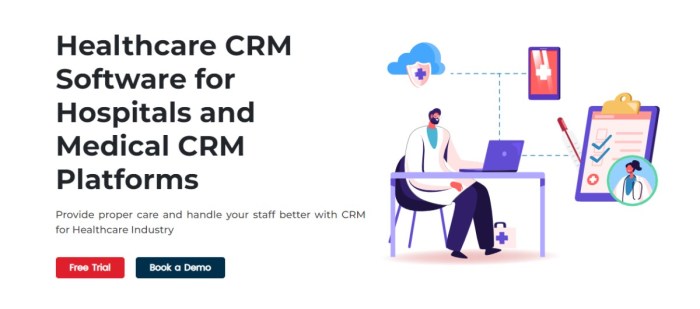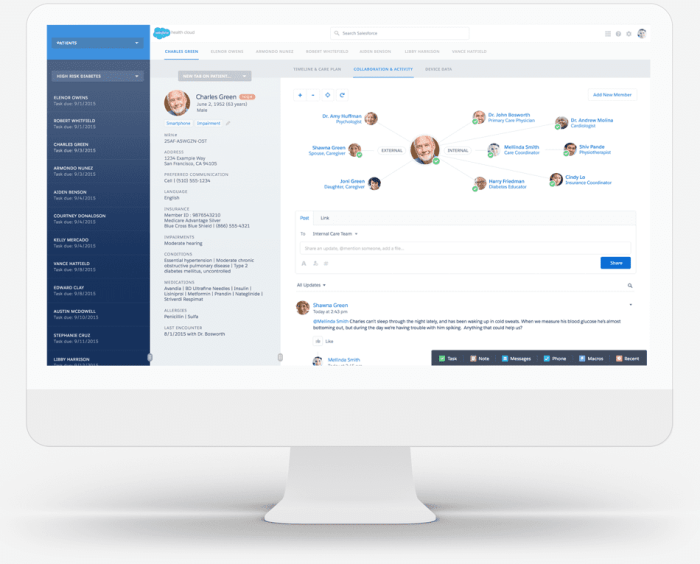Best healthcare CRM software is revolutionizing patient care. Efficiently managing patient interactions, appointments, and medical records is crucial for modern healthcare providers. A robust CRM system can significantly improve operational efficiency, enhance patient satisfaction, and ultimately contribute to better health outcomes. This allows healthcare professionals to focus on what matters most: their patients.
Choosing the right software involves considering factors such as integration with existing systems, scalability to accommodate growth, and features tailored to specific healthcare needs. From appointment scheduling and billing to patient communication and data analysis, the right CRM can transform how a healthcare practice operates.
The healthcare industry is rapidly evolving, demanding efficient and streamlined operations. A robust Customer Relationship Management (CRM) system is no longer a luxury but a necessity for healthcare providers of all sizes. From managing patient records and appointments to improving communication and boosting patient engagement, the right healthcare CRM can significantly enhance operational efficiency and patient satisfaction. This comprehensive guide explores the best healthcare CRM software options available, helping you choose the perfect solution for your specific needs.
Understanding the Need for Healthcare CRM Software
Healthcare providers face unique challenges in managing patient data, appointments, and communication. Traditional methods often prove inefficient, leading to administrative bottlenecks, missed appointments, and poor patient experiences. A healthcare CRM addresses these challenges by centralizing patient information, automating workflows, and improving communication channels. Key benefits include:
- Improved Patient Engagement: Personalized communication, appointment reminders, and follow-up messages enhance patient experience and adherence to treatment plans.
- Streamlined Workflow: Automation of tasks such as appointment scheduling, billing, and follow-up reduces administrative burden and frees up staff time.
- Enhanced Data Management: Centralized patient records ensure easy access to comprehensive information, reducing errors and improving care coordination.
- Better Communication: Secure messaging platforms and integrated communication tools facilitate seamless communication between patients, providers, and staff.
- Increased Revenue: Improved efficiency, reduced administrative costs, and enhanced patient retention contribute to increased revenue.
- Improved Patient Outcomes: Better communication and coordinated care contribute to improved patient outcomes and satisfaction.
Key Features to Look for in Healthcare CRM Software
When selecting a healthcare CRM, consider these essential features:
Patient Management Capabilities
- Comprehensive Patient Profiles: Ability to store detailed patient information, including medical history, insurance details, and contact information.
- Secure Data Storage: Compliance with HIPAA and other relevant regulations for data privacy and security.
- Appointment Scheduling: Integrated scheduling tools for easy appointment booking, rescheduling, and management.
- Electronic Health Records (EHR) Integration: Seamless integration with existing EHR systems for efficient data exchange.
Communication and Engagement Tools, Best healthcare crm software
- Secure Messaging: HIPAA-compliant messaging for secure communication with patients.
- Automated Reminders and Notifications: Automated appointment reminders, medication reminders, and follow-up messages.
- Patient Portals: Self-service portals for patients to access their records, schedule appointments, and communicate with providers.
- Multi-Channel Communication: Support for various communication channels, including email, SMS, and phone calls.
Reporting and Analytics
- Customizable Reports: Ability to generate customized reports on key performance indicators (KPIs).
- Data Analysis Tools: Tools for analyzing patient data to identify trends and improve care delivery.
- Real-time Dashboards: Real-time dashboards providing an overview of key metrics.
Other Important Considerations
- Scalability: Ability to accommodate growth in patient volume and staff size.
- Integration Capabilities: Seamless integration with other healthcare systems and applications.
- User-Friendliness: Intuitive interface that is easy for staff to learn and use.
- Customer Support: Reliable and responsive customer support.
- Cost-Effectiveness: Pricing model that aligns with your budget and needs.
Top Healthcare CRM Software Options
The market offers a variety of healthcare CRM software solutions. Choosing the right one depends on your specific needs and budget. Some popular options include (Note: This is not an exhaustive list, and specific features and pricing may vary):

Source: geekflare.com
- Salesforce Health Cloud: A comprehensive platform offering robust features for patient engagement, care coordination, and data management. Known for its scalability and extensive integrations.
- HubSpot CRM: A user-friendly option with a strong focus on marketing and sales automation. While not specifically designed for healthcare, its flexibility makes it adaptable for some practices.
- Practice Fusion: An EHR and practice management system with integrated CRM capabilities. Offers a streamlined workflow for managing patient records and appointments.
- Kareo: A cloud-based platform designed specifically for medical practices. Provides features for billing, scheduling, and patient communication.
- Athenahealth: A comprehensive platform for managing all aspects of a healthcare practice, including CRM functionalities.
Choosing the Right Healthcare CRM for Your Practice
Selecting the optimal healthcare CRM requires careful consideration of several factors:

Source: whatfix.com
- Practice Size and Type: The size and type of your practice will influence the features and functionality you need.
- Budget: Healthcare CRMs vary significantly in price, so it’s crucial to establish a budget beforehand.
- Integration Needs: Consider the need for integration with existing EHR systems and other applications.
- Staff Expertise: Choose a system that is user-friendly and easy for your staff to learn and use.
- Future Scalability: Select a solution that can accommodate your practice’s growth in the future.
Frequently Asked Questions (FAQ)
- Q: Is a healthcare CRM compliant with HIPAA? A: Reputable healthcare CRMs are designed to comply with HIPAA regulations, ensuring the security and privacy of patient data. Always verify compliance before selecting a solution.
- Q: How much does healthcare CRM software cost? A: The cost varies significantly depending on the features, vendor, and number of users. Pricing models can include subscription fees, per-user fees, or a combination of both.
- Q: How long does it take to implement a healthcare CRM? A: Implementation time varies depending on the complexity of the system and the size of your practice. It can range from a few weeks to several months.
- Q: What are the key benefits of using a healthcare CRM? A: Key benefits include improved patient engagement, streamlined workflows, enhanced data management, better communication, and increased revenue.
- Q: Can a healthcare CRM integrate with my existing EHR system? A: Many healthcare CRMs offer integration capabilities with popular EHR systems. Check the vendor’s specifications to ensure compatibility.
Conclusion
Investing in the right healthcare CRM software is a strategic decision that can significantly improve your practice’s efficiency, patient satisfaction, and bottom line. By carefully considering your needs and evaluating the available options, you can find a solution that optimizes your workflows and enhances the overall patient experience. Remember to prioritize HIPAA compliance, user-friendliness, and scalability when making your selection.
Call to Action
Ready to transform your healthcare practice with a powerful CRM? Contact us today for a free consultation and let us help you find the perfect solution for your needs!
In conclusion, selecting the best healthcare CRM software is a strategic decision that can profoundly impact a practice’s success. By carefully evaluating features, considering integration capabilities, and prioritizing user-friendliness, healthcare providers can leverage technology to improve patient care, streamline workflows, and achieve greater efficiency. The benefits extend beyond operational improvements, ultimately contributing to a more positive and effective patient experience.
Selecting the best healthcare CRM software requires careful consideration of your specific needs. The right system streamlines patient interactions and improves overall practice management, much like the benefits seen in other sectors. For instance, crm software for law firms offers similar advantages in client relationship management and case tracking. Ultimately, finding the optimal CRM, whether for healthcare or another field, hinges on efficient data management and enhanced client communication.
General Inquiries: Best Healthcare Crm Software
What is the average cost of healthcare CRM software?
Costs vary greatly depending on features, scalability, and vendor. Expect a range from subscription-based models with monthly fees to larger upfront investments for more comprehensive systems.
How can I ensure my chosen software complies with HIPAA regulations?
Verify that the software vendor explicitly states HIPAA compliance and offers robust security features, including data encryption and access controls. Request documentation outlining their security practices.
What are the key features to look for in healthcare CRM software?
Essential features include appointment scheduling, patient portals, electronic health record (EHR) integration, billing and payment processing, automated communication tools, and robust reporting and analytics capabilities.
How long does it typically take to implement a healthcare CRM system?
Implementation timelines vary depending on the complexity of the system and the size of the healthcare practice. Expect a process ranging from several weeks to several months.
